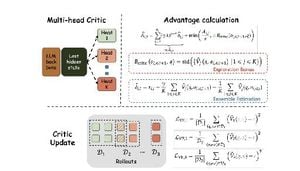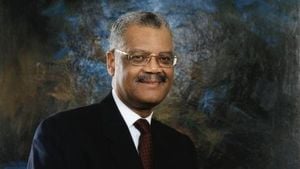President Donald Trump hosted Nvidia CEO Jensen Huang at the White House on Friday, where the key agenda was centered around artificial intelligence (AI) and its regulations within the United States. The meeting, which had been set weeks in advance according to sources familiar with the details, marks a pivotal moment as the Trump administration considers new restrictions on AI chip sales to China.
Nvidia, headquartered in Santa Clara, California, is recognized for designing and supplying advanced computer chips integral to developing AI technologies. The outcome of this discussion is particularly significant as concerns mount over China’s rapid advancements, exemplified by the launch of its AI assistant, DeepSeek, which has made waves by becoming the most downloaded app on Apple’s App Store shortly after its release.
According to reports, the Trump administration is actively exploring mechanisms to tighten controls on AI chip exports. The anticipated changes come at the heels of fears surrounding China potentially catching up to the U.S. lead in AI technology. Huang's engagement with Trump is viewed as part of broader discussions on how to secure America’s technological edge and prevent advanced computing power from falling to competitors.
DeepSeek’s impressive achievements include claims of high-performance AI models developed at lower costs, raising alarms within U.S. tech circles. Shares of major players like Nvidia saw significant fluctuations, with reports indicating Nvidia shares plummeting as much as 17% amid fears of diminishing market dominance.
Trump's national security adviser, Michael Waltz, is under pressure from lawmakers to contemplate the potential benefits of imposing export controls on Nvidia's semiconductor chips, particularly those utilized by DeepSeek. Representatives John Moolenaar and Raja Krishnamoorthi emphasized the necessity of placing updated export regulations to deter China from capitalizing on loopholes within the current framework.
They noted the preference for immediate reforms to align with the urgent need for safeguarding American innovations, reflecting the heightened scrutiny placed on how technology reaches adversarial states. The lawmakers articulated this by stating, "This demonstrates what the Select Committee has long argued: frequently updating export controls is imperative to prevent China from exploiting regulatory gaps and loopholes to advance their AI ambitions.”
The root concern here is not just about immediate economic impacts but also about national security. Last year, the Biden administration moved to restrict sales of Nvidia’s most advanced AI chips to China, only to have Nvidia pivot by introducing modified versions (the H800) for the Chinese market. This shift underlines the competitive tactics employed by Nvidia to retain market presence amid regulatory challenges.
While the Trump administration has not publicly disclosed precise details about any new regulations, the framing of stricter export controls encapsulates the sentiment of prioritizing national interests over open trade, particularly with nations perceived as adversaries.
"The meeting is fundamentally about establishing dialogue and fostering cooperation on AI policy," stated the source who spoke on condition of anonymity. It remains to be seen how these discussions will influence Nvidia's operations moving forward, especially with legislation on export controls under review.
Nvidia's spokesperson was tight-lipped about the matter but emphasized the company’s commitment to complying with all applicable laws, adding, “Our public filings report ‘bill to’ not ‘ship to’ locations of our customers.” This highlights the company's operational transparency, particularly about their business interactions with regions deemed contentious.
Looking forward, the outcome of Trump’s meeting with Huang may set the tone for future U.S. policy on AI technologies, especially as global competition becomes more heated. Considering the rapid advancements from competitors abroad, including efforts by Chinese firms which boast competitive pricing and comparable technologies, the necessity for such discussions between industry leaders and policymakers is underscored.
Overall, this White House meeting encapsulates the volatility and dynamic nature of the AI sector, balanced against the backdrop of international trade and national security. The next steps taken by the Trump administration, following this significant engagement with one of the leading figures in tech, will be pivotal not only for Nvidia but potentially for the entire tech industry's future direction.



